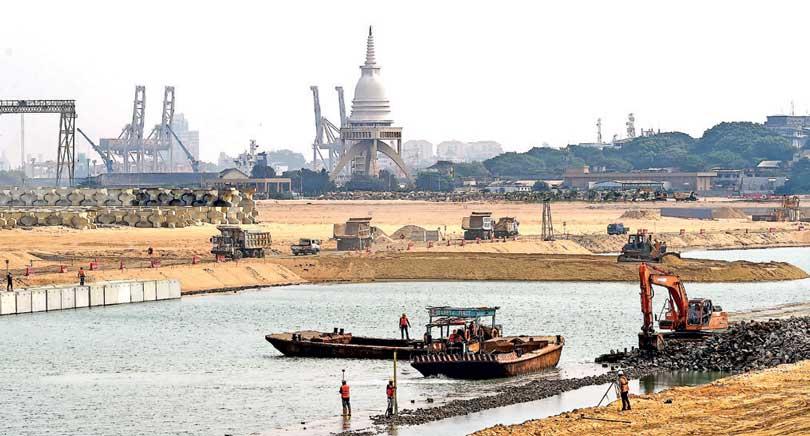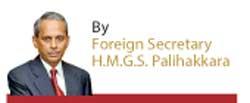

Secondly, the Sri Lankan public policy apparatus have to reckon with a troubling dichotomy viz. the absence of, as well as the need for, reviving at least a bipartisan understanding, if not a wider common ground, on the key post-crisis public policy issues in general and foreign relations and domestic reforms issues in particular. If on the other hand, these critical issues continue to become expendables in the Medieval sport called the election politics in this country, the crisis recovery effort could mutate into a repetition of past follies yet again. And, down the road, we will most likely be chasing the lenders of last resort -IMF or other-yet again.
Navigating Sri Lanka’s foreign relations in this cauldron of churning issues in both international as well as national contexts, will require grappling with challenges in three principal areas. The three are obviously interactive and interrelated. Most, if not all, of the mare also outgrowths of domestic public policy deficits and political failures.
First the elephant in the room- managing the inventory of external inputs necessary to recover from crisis, stabilise and reach a sustainable growth path as quickly as possible. This will require a carefully and pragmatically constructed binary of diplomatic activity viz. hard-nosed negotiations and harmonizing diplomacy. While technical negotiations must of necessity be based on sound economic analysis, diplomatic demarches to mobilise creditors on to a common platform helpful to us will be as important as good economic analysis.
The second task is the handling of the ‘trilemma’ of deepening and widening our vital relations with India, China, and the United States-led Western condominium, without ruffling their respective geopolitical feathers by developing a transparent policy and a prudent strategy to remain engaged with all without getting entrenched with any.
The third is that Sri Lanka seemed to have acquired the image of an accountability starved country. Some may prefer to ignore this inconvenient truth. But it is the stark reality. The accountability issues relate not only to the ethnic conflict, but also to governance and politics in general straddling both the conflict as well as the post conflict period up to now. What is more, it has become highly externalised bringing in its wake a number of foreign relations and diplomacy challenges.
Given these diverse, but interrelated tasks, the overarching challenge for Sri Lankan diplomacy will be to show that we are after economic benefits, not strategic or geopolitical mischief and that Sri Lanka will aggressively exploit the full investment and trading potential of all FDI and credit sources including China’s BRI, The US led Indo-Pacific Economic Framework for Prosperity (IPEF), Regional Comprehensive Economic Partnership (RCEP), and so on.
However, this is easily said than done esp. in our region, the latest theatre of power play-the Indo Pacific– which is increasingly showing signs of a competitive breeding ground for power rivalries and countervailing alliances, armed or unarmed, nuclear or conventional. Adding to this, some emerging ‘Indo-Pacific alliances’ seek to aggressively contain one rising power while playing sherpa to other rising powers.
In this context, alliance neutrality, not alliance partnership, is the sensible bet for the likes of Sri Lanka, to maximize and possibly leverage its much talked about strategic location value.
In doing so, what should be the policy approach?
Is it having demarcated ‘zones’ for different investor States by ‘parceling out’ our sovereign assets including land, to contending powers thus creating different ‘mono-national investment zones’ as may be happening now? Or the whole of Sri Lanka should and can become a venue for multinational investment and multilateral cooperation for growth and development? The former is unwise and may eventually make parts of Sri Lanka non self-governing territories. But the latter approach may help avert geopolitical binds for us involving regional or extra regional powers. And the country will not be the ground zero for a ‘zero sum’ strategic power play by anyone.
We as Sri Lankans may dislike or even despise this particular characterization. However, for a number of well-founded or ill-founded reasons, it may well be a troubling consternation to the Indian security establishment and also a spot of bother to the Western Alliance.
Do we need to invent a brand new policy act as if nothing existed or is there an immediate external threat to the fundamentals of the nation state and people? Probably not - so what we need is a refurbishing of what exists, in order to try to cope with the current flux.
These considerations take us to the kernel of an overall policy framework that can be anchored in three elements: -
■First, a neutral policy that does not entail military alignments or military foot prints while shunning power rivalries and related doctrines. If one is shy of calling this non-aligned because it is old-fashioned, so be it ‘neutral’- without having to get enmeshed in a semantic debate about nomenclatures. (Neutrality principle)
■Second, friendship and engagement with all expecting reciprocal respect for Sri Lanka’s sovereign autonomy, territorial integrity and independence.
■Third, an enlightened policy of international cooperation including with the UN for achieving Sustainable Development Goals (SDGs), Peace and Security in accordance with international law including the UN Charter. Accountability challenge can be subsumed here.
Some tend to confuse or conflate the ‘institution’ of the Non-Aligned Movement (NAM) with the ‘idea’ of non-alignment. This is too simplistic an attitude towards a dynamic conception.
Neutrality is not about distancing and meek diplomacy. It is about engagement and robust diplomacy. It is engagement with all without getting entrenched with any. Core of the policy is shunning power rivalries, old or new leading to war - hot or cold.
For Sri Lanka, a good start will be to consider the desirability of public articulation of a prudent Port Calls regime—a policy that will inter-alia invite, subject to safeguards, all vessels plying the Indo-pacific waters to visit us and boost our port incomes consistent with the ‘freedom of navigation’ and ‘innocent passage’ norms, barring those ships on overt or covert conflict related missions.
Last but not the least, almost every crisis embeds an opportunity as well. The current crisis in Sri Lanka, is no exception. In its broadest sense, it is a crisis of accountability.
What was unique and common to all this was a good bipartisan political support for these diplomatic endeavours. The determinant was the national interest, not partisan posturing.
The late Foreign Minister Lakshman Kadirgamar was an indefatigable advocate of such a consensual culture in governance and foreign policy. It enabled us to do things like peacemaking nationally while combating terrorism internationally.
This is the month of August-yet another anniversary of this visionary man’s untimely death.It is perhaps time to revisit these rewarding policies.

No comments:
Post a Comment